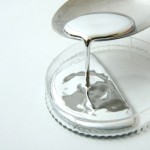In my last post I mentioned that fructose metabolism appears to be more complex than I learned in medical school. Of course that was in 1962-1966 and a lot has changed in medical knowledge in the forty-five plus years since then. We all know that fructose, in the form of high-fructose corn syrup (HFCS) is added to many processed foods and sweetened drinks; the question being debated is, "Is that bad for us?"
I've been reading a variety of articles from the medical literature and some popular websites on the subject and not all scientists, physicians and dietitians agree on the answer. I previously mentioned a Mayo Clinic online article that stresses the need to cut our added-sugar intake, both table sugar and HFCS, and mentions that research on HFCS isn't yet at the point to implicate it as worse for you than other added sweeteners.
There's also an article by Jennifer Goldstein from Prevention magazine that I found on the msnbc website. I'm not sure of her science background (she's now the Beauty Director for the magazine). Nonetheless, her article is reasonably well-balanced, if you read between the lines. The over-all conclusion is that anti-HFCS evidence is slim. She quotes an NYC-based nutritionist as saying the calories in HFCS and table sugar, gram for gram, are equal, but mentions several reports that have shown HFCS samples may contain mercury... in small amounts.
Mercury is a neurotoxin, a substance which can damage the brain, especially the developing brain of a fetus or infant. Even "small amounts" are considered dangerous for babies in the womb. We have all heard of its presence in fish, but mercury in HFCS was new to me. I'm about three years behind, it appears. I found a Washington Post article from January, 2009 which mentioned two studies examining this issue.
At that time, in spite of industry denials, nearly half of HFCS samples tested contained mercury as did almost a third of processed food and beverage products. The researchers writing on this enormously significant problem noted that HFCS had been made using chemicals produced in industrial plants clinging to an outmoded, 19th century method
A now-retired FDA scientist, Renee Dufault, headed a study in 2009 showing low levels of mercury in all the processed foods she and colleagues tested (and none in organic foods) and then had their results verified by two independent labs. She then says the FDA's head of their Food Additives section told her to quit her HFCS studies. She quit the FDA instead and published her results. A physician-headed team at the Institute for Agriculture and Trade Policy, a non-profit watchdog, repeated her studies using commercial beverages and foods. Their twenty-plus-page paper is worth reading.
By the middle of December, 2010, the HFCS industry had gotten the message. But until all HFCS made in the United States is mercury-free I'm going to avoid it.



